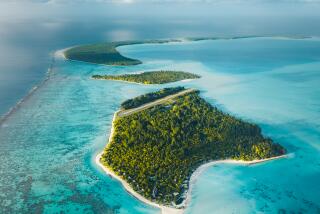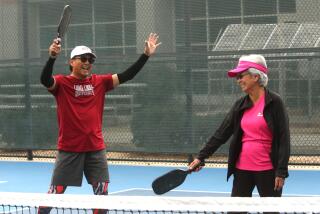Heartwarming thoughts about a long, uncomplicated life on the island of Crete--but, sorry, no thanks!
- Share via
As a cardiac patient, I always read those articles in magazines and newspapers that report the latest findings on how to have a healthy arterial system and live longer.
It isn’t easy to keep up. One month cholesterol is in, the next it’s out. One month exercise is good for you, the next it will kill you.
The only prohibited vices the medical profession seems consistent about are smoking and eating salt.
No problem. I quit smoking 25 years ago, and I never use a salt shaker. (I get my salt from bacon.)
But there are some things I won’t give up just to live a few years longer. I suppose that if I were confronted with an either/or--either give up huevos rancheros or die in one year--I would give up huevos rancheros .
I believe the purpose of life is to keep on living and see what happens next. But there are some sacrifices that I would not make merely to live longer.
For example, we’re always reading that the Japanese do not die of heart attacks because they live on fish and rice, both of which are low in cholesterol.
I like fish, if it’s fresh and well-prepared, but I’m not crazy about rice in any form. If I were assured that I could live to 90 if I were to eat nothing but fish and rice, I think I’d decline.
Because of my life style and my temperament, I have identified myself as a perfect Type A, as described by Dr. Meyer Friedman in his book, “Type A Behavior and Your Heart.” In fact, he quotes me in his first paragraph:
“Some time ago, I quit worrying about what to do, or not to do, to keep from having a heart attack. I was so confused by all the conflicting theories that I began developing the symptoms. . . .”
Dr. Friedman commented: “
“Mr. Smith’s situation is justified, and he is probably speaking for many Americans.”
Now I have received a note from Dr. Henry Blackburn, director of the Division of Epidemiology, University of Minnesota, enclosing a recent paper of his on “the low risk coronary male.”
According to Dr. Blackburn, the man most unlikely to have a heart attack is a Greek shepherd, farmer, beekeeper or fisherman, or a tender of olives or vines; he lives on the island of Crete.
Dr. Blackburn first recalls a satirical portrait of the “low coronary risk male” by Gordon Myers of Boston, which begins:
“An effeminate municipal worker or embalmer, completely lacking in physical and mental alertness and without drive, ambition or competitive spirit, who has never attempted to meet a deadline of any kind. . . .”
But Dr. Blackburn says his Greek islander is “the man truly most free of coronary risk of all men on Earth.”
This happy fellow walks to work daily and “labors in the soft light of his Greek isle, midst the droning of crickets and the bray of distant donkeys, in the peace of his land.”
For lunch he has a lemonade and a meal at the local cafe, and then a nap at home before going back to work.
For his main meal he has eggplant, mushrooms, vegetables and country bread dipped in olive oil. Once a week he has lamb, once a week chicken, twice a week fresh fish. After that, salad, followed by dates, Turkish sweets, nuts and fruits, with a glass of the local wine.
Saturday nights he has a festive dinner with family, then parties with friends, and takes part in a passionate midnight dance in the grain fields.
Sunday he goes to church, and spends a quiet afternoon with his family in the shade, “cooled by the salubrious sea breeze, gently perfumed by smoke from olive-wood charcoal grills, and fragrances wafted from the fields of herbs and fresh animal dung. . . .”
He does not spend his Sunday tied in knots in front of a TV set watching the Super Bowl.
Dr. Blackburn notes that this man of Crete lives in harmony with nature and the landscape, secure of his niche in the long history of Greek civilization.
“He relishes the natural rhythmic cycles and contrasts of his culture: work and rest, solitude and socialization, seriousness and laughter, routine and revelry.
“In his elder years, he sits in the slanting bronze light of the Greek sun, enveloped in a rich lavender aura from the Aegean sea and sky. . . .”
I suppose I could retire and live in the Greek islands, sitting “in the slanting bronze light of the Greek sun. . . .”
But sooner or later, I suspect, I’d begin to crave some stress. I’d miss my daily paper; I’d miss knowing how the Dodgers and the Angels were doing in September; I’d miss going out to dinner and going to the Music Center; I’d miss those trashy miniseries on TV; I’d miss the National Football League; I’d miss my family.
Of course my wife would be with me. Otherwise, who’d cook my eggplant?
But I’m afraid I’d never feel at home. I would have no feeling of my niche in history.
Here, after all, is where I belong, in the wonderful wasteland of Los Angeles, here on the freeways, here in my hot tub, here with my bacon and eggs and Big Macs and huevos rancheros and Mexican beer. Here with my books and my TV and my daily avalanche of junk mail.
Maybe we’ll just go to Crete this year for a visit.
I’d like to try the local wine and dance passionately in the moonlight.






